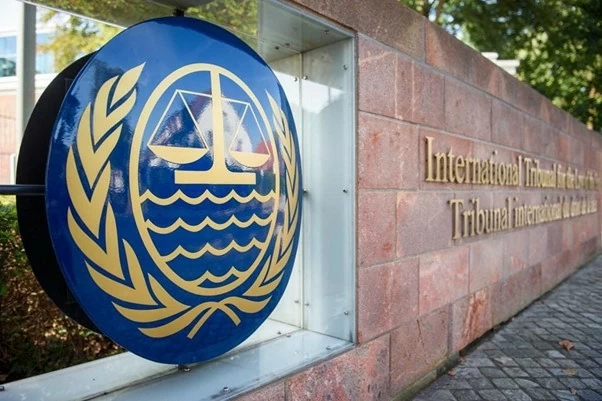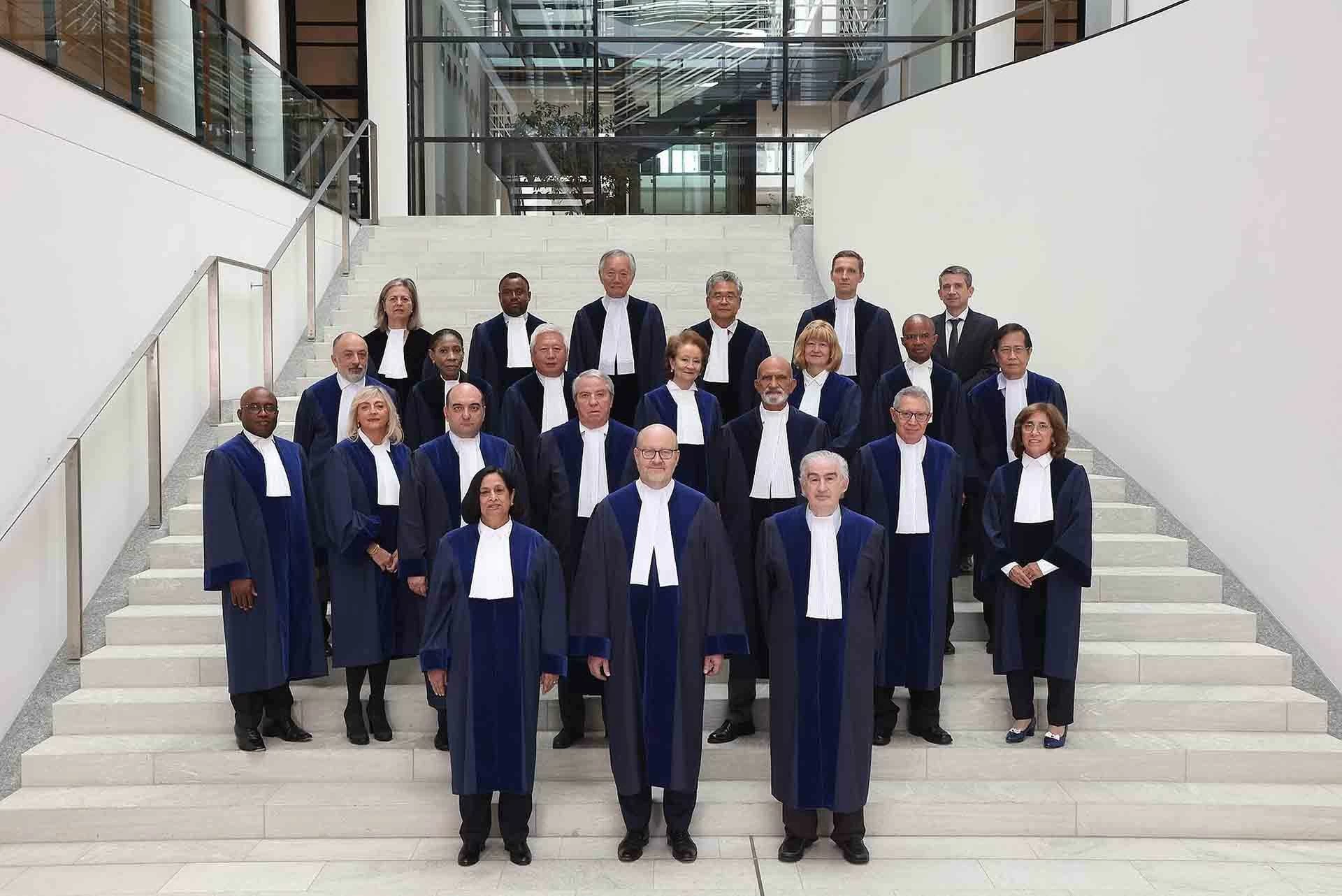
The role of ITLOS in the legal order for the seas and oceans
Latest
On November 16, 1994, the United Nations Convention on the Law of the Sea 1982 (UNCLOS) – referred to as the “Constitution for the Seas and Oceans” – officially came into effect, establishing the legal framework for all activities in the seas and oceans at national, regional, and global levels.
 |
| The emblem of the International Tribual for the Law of the Seas (ITLOS) outside their premises in Hamburg, northern Germany. (Photo: AFP) |
Notably, UNCLOS provides a an unprecedented settlement regime for maritime disputes. In particular, the entry into force of UNCLOS laid the foundation for the establishment of ITLOS. With jurisdiction over disputes relating to the interpretation and application of UNCLOS among states that choose the Tribunal as the competent procedure, as well as legal matters provided for in other agreements between states parties, the creation of ITLOS ed a significant advancement in enhancing the international legal framework for maritime dispute resolution.
This is particularly significant in the context of increasing demands for the use and exploitation of the seas, the growing complexity of maritime disputes, and the worsening s of the marine environment, all of which directly affects the rights and interests of coastal states and the international community, including Vietnam.
A level playing field for all nations
Over nearly three decades, ITLOS has taken on 33 disputes related to various maritime legal issues involving countries from all regions of the world.
Cases such as the “Grand Prince” between Belize and France, the “Mox Plant” between Ireland and the UK, the “Arctic Sunrise” between the Netherlands and Russia, and the seizure of a Ukrainian naval vessel between Ukraine and Russia demonstrate ITLOS's capacity to provide equitable solutions in disputes between smaller nations and larger, more politically and economically powerful states. Through this, ITLOS has established itself as a "level playing field" that all member states, regardless of size, can utilize to protect their lawful rights as stipulated by UNCLOS.
Importantly, the efficiency of ITLOS’s operations is noteworthy. The average time for ITLOS to resolve complex disputes is two years. For disputes concerning provisional measures and prompt release of vessels, ITLOS often takes just one month to consider and issue rulings.
The operational efficiency of ITLOS contributes to reducing the time and costs associated with litigation for states—a crucial factor for developing nations. Resolving disputes through ITLOS also proves to be a more "cost-effective" solution compared to arbitration, as disputing parties are not required to pay costs for judges or the Tribunal's Registry.
If requested, ITLOS can establish a Special Chamber composed of members approved by the parties, offering more flexible procedures. Special Chambers have been used in maritime delimitation disputes between Ghana and Côte d'Ivoire, between Mauritius and the Maldives, and in the conservation of swordfish resources in the Southeast Pacific between Chile and the EU.
 |
| Judges of the International Tribunal for the Law of the Sea. (Photo: ITLOS) |
Clarifying key legal issues
ITLOS has made significant contributions to clarifying important legal issues under UNCLOS, providing direction for states in their maritime activities.
For example, in the matter of maritime delimitation, ITLOS was the first tribunal to affirm that states could delimit extended continental shelves in the absence of a recommendation from the Commission on the Limits of the Continental Shelf (in the case of delimitation between Bangladesh and Myanmar). ITLOS was also the first body to delimit maritime boundaries between two archipelagic states (in the case of delimitation between Mauritius and the Maldives), thereby clarifying the legal status of archipelagos in maritime delimitation.
Regarding the protection of the marine environment, through its rulings and advisory opinions, ITLOS has clearly defined states’ obligations to adopt a precautionary approach and exercise due diligence when undertaking activities that may impact the marine environment. The Tribunal asserts that all states have the duty to cooperate in the protection of the marine environment and the conservation of marine resources. It confirms that greenhouse gas emissions constitute pollution of the marine environment and that states must take all necessary measures to prevent, reduce, and control marine environmental pollution related to the impacts of climate change, sea-level rise, and ocean acidification.
Additionally, ITLOS has made contributions in clarifying states' obligations to ensure freedom of navigation, regulate activities in the international seabed area, promptly release vessels, refrain from the use of force in law enforcement activities at sea, and prevent illegal, unreported, and unregulated (IUU) fishing.
Maintaining legal order for the seas and oceans
The effectiveness of ITLOS in promoting order at sea is also evident in the fact that most of its rulings or decisions are fully complied with by the concerned parties.
France has participated in compulsory dispute settlement procedures at ITLOS three times and complied with ITLOS’s decisions in all cases. Japan has had two disputes brought by Russia before ITLOS, and in both instances, Japan implemented the Tribunal’s decisions. In the “Arctic Sunrise” case, Russia released the crew and vessel of the Netherlands following ITLOS's ruling.
Even in sensitive disputes such as maritime delimitation, ITLOS's rulings are adhered to by the concerned parties. For instance, both Bangladesh and Myanmar issued statements committing to implement the Tribunal’s ruling regarding delimitation in the Bay of Bengal. In the maritime delimitation case between Ghana and Côte d'Ivoire, immediately after the Special Chamber of ITLOS issued its judgment, the two countries released a joint statement affirming their acceptance of the ruling and established a joint commission to implement it.
Vietnam’s contributions
As an active and responsible state party to UNCLOS, Vietnam supports the peaceful resolution of maritime disputes through the mechanisms provided by UNCLOS, including ITLOS.
Since becoming a member of UNCLOS, the relationship between Vietnam and ITLOS has developed significantly. The two sides regularly meet, engage, and exchange views on enhancing cooperation. ITLOS judges actively participate in law of the sea seminars organized by Vietnam. Vietnam also frequently sends representatives to capacity-building programs conducted by ITLOS.
In 2023, Vietnam fully participated for the first time in the ITLOS advisory opinions proceedings regarding state obligations related to climate change. The particiation not only reflects the high priority given to the issue of climate change but also highlights Vietnam's support for ITLOS and its jurisdiction, and demonstrates Vietnam's substantive contributions to assisting the Tribunal in addressing key legal issues concerning the s and oceans.
Recently, Vietnam decided to nominate a candidate for the position of ITLOS judge for the term 2026-2035. This reflects Vietnam's strong commitment to peacefully resolving law of the sea disputes through ITLOS and shows that Vietnam values ITLOS's role and is willing to contribute positively to its work in maintaining and promoting order for the seas and oceans.
| ITLOS was officially established on August 1, 1996, with its headquarters in Hamburg, Germany. It is a judicial body created under Annex VI of UNCLOS, tasked primarily with resolving disputes and providing advisory opinions on law of the sea. The Tribunal comprises 21 judges, elected by UNCLOS states parties, for a term of nine years and with the possibility of re-election. |









